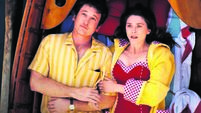Stevie G: Angie Stone will be missed by all
Angie Stone’s tragic death is particularly heartbreaking, especially for those who grew up with her music these last few decades.
Angie Stone was a key voice in hip-hop culture, and in her early days she helped spearhead The Sequence, as a rapper named Angie B. A pioneering female group signed to Sugar Hill Records, The Sequence had a big underground hit with Funk U Up (later re-recorded and updated with Angie, Bahamadia, Erykah Badu, and Queen Latifah) and they were also the group who backed Spoonie Gee on the legendary Monster Jam. A much loved and much sampled group, The Sequence eventually disbanded and Angie sang with Mantronix and the group Vertical Hold, before releasing music with Devox in the mid 90s.
It was during this period where she came to my attention, and she was heavily involved in shaping the sound which became known to the world eventually as neo-soul.
She was in a relationship with D’Angelo and contributed heavily to his landmark music in this era, but Angie herself was soon to achieve proper solo success too. ‘Everyday’ and ‘No More Rain’ became huge singles here in Cork and helped shape the sound of not only Sir Henry’s back bar but also Radio Friendly too.
These were the years of D’Angelo, Erykah Badu, The Roots, Maxwell, Sunshine Anderson, Musiq Soulchild, Jill Scott, Lauryn Hill and more, and it was welcomed by a music industry who welcomed a more organic traditional soulful sound that harked back to the 70s soul of Marvin, Stevie, Curtis and others. Modern 90s R&B had become huge in this time, but the neo-soul side of things was more acceptable to many music fans, who were becoming disillusioned with the increasing materialism and formulaic approach to 90s hip-hop and R&B. The Soulaquarians, which included D’Angelo, Questlove, Dilla, James Poyser and others, helped shape this era musically, but in truth there was a very wide ranging group of artists and musicians linking the golden age of soul to this new movement. Omar and Sade and Soul 2 Soul and others had been doing this for a long time too, so in truth, real soul music never went away.
By the time Angie released her second solo album, Mahogany Soul, even the pop world was becoming more receptive, and ‘Wish I Didn’t Miss You’ became a global hit. Angie’s best known song is probably one of the few records which rarely leaves my own crates, and it works at every party to this day. This is quite simply soul music at its best. Riding over a philly soul orchestration from the O’Jays’ Backstabbers, it’s a song that still stops people in their tracks, and it’s been remixed a million times over too.
Her tragic death was very sad, and, on a personal level, her music guided many of my parties and radio shows for nearly 30 years. Seeing her in Dublin during her first visit here, around the time of Black Diamond, I was embarrassed that the crowd was so small in the Olympia theatre. Angie was not to be disheartened, and invited everybody down to the front two rows and turned it into a huge house party jam, and left everyone remembering the show forever. She really was a great performer and had been performing on stage only hours before her death too.
Those days in the 90s were also significant in redeveloping an interest in the soul legends of eras before. Gwen McRae and Roberta Flack were two great singers who I became obsessed with at the time, and both died last week as well. Their influence is illustrated by the many samples and of course some covers too, most notably ‘Killing Me Softly’ by the Fugees, which was an update of Roberta’s version, and which helped bring the aforementioned soul revival into the mainstream back in 1996.
All of these singers will be sadly missed.







